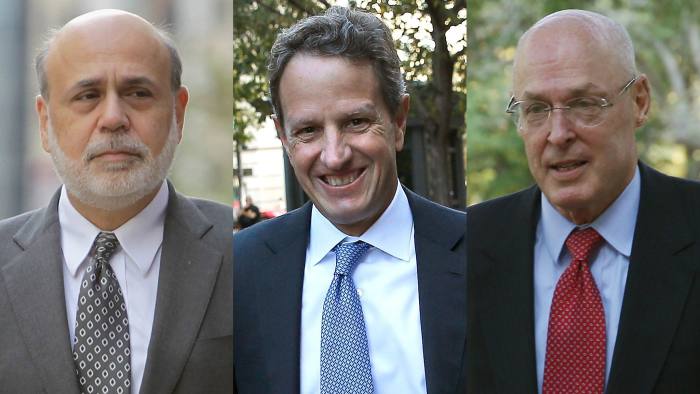European banks still have post-crisis repairs to do
Former US policymakers say their counterparts did not do enough to stop the rot
Gillian Tett

Ben Bernanke, Timothy Geithner and Henry Paulson © Getty
It is not easy to make a financial crisis sound boring. This week Ben Bernanke, Henry Paulson and Timothy Geithner almost did that. With the 10-year anniversary of the Lehman Brothers collapse approaching, the three luminaries — who were respectively US Federal Reserve chairman, Treasury secretary and New York Federal Reserve president in 2008 — have been talking to the media about the crisis. And their verdict is sanguine — if not a little smug.
More notably, a decade on, the trio believe that US finance has rebounded so well that it is in rude health. And they think that this happy outcome largely vindicates their policy response after the crisis, including their decisions to recapitalise aggressively the banks with government funds, reveal bad loans, impose tougher oversight — and implement quantitative easing quickly.
To be sure, the three men admit that policy has not been perfect. They fret that Congress has undercut the statutory powers used to quell the 2008 shock. “The defences are better but you have a weaker set of tools for dealing with an extreme crisis,” observed Mr Geithner. They also worry about the rising American government debt, and what might happen if there is a rollback of post-crisis reforms.
American banks now seem healthy. The US has enjoyed nine years of growth — and its government recouped the money used to support banks, with a profit, they say. The post-crisis policy performance probably does not merit an A+, but an A or thereabouts.
Not all Americans would agree. Leftwing observers are understandably angry that so few financiers were ever punished. Critics on the right complain that markets have been hopelessly distorted by government meddling. Meanwhile bodies such as the Bank for International Settlements fear that higher rates will create problems in the corporate leverage sector, and note that derivatives sector remains too opaque. All these points need more debate.
But the most interesting (and urgent) debate that needs to take place in response to what Mr Bernanke and the others have to say does not concern the US at all. The trio also revealed this week that they are surprised and dismayed by the degree to which Europe’s financial system remains troubled a decade on.
That is not because they predict an imminent crisis — they refused to comment on current flashpoints, such as small Italian lenders or the giant Deutsche Bank. But they worry that the system remains rather weak and think they know why: unlike their American counterparts, continental European leaders did not proactively use government funds to recapitalise their banks, insist on proper transparency about bad loans or close down insolvent lenders.
Accounting systems were partly to blame. “In the early days of the crisis the European banks were in worse shape than the US banks and they hid it because . . . the US bank accounting is much more rigorous,” Mr Paulson observed. The trio also argue that European politicians and voters were so keen to punish banks that it was hard to use government money.
But the biggest problem was political structure. In 2008 Messrs Bernanke, Paulson and Geithner had enough power as a unified team to explore policy trade-offs and implement unpopular decisions. But because the eurozone political system is so fragmented, policymakers never took the swift and aggressive collective action that was needed to stop the rot.
“We were very lucky,” Mr Geithner observed. “Some of those options [we used] were not available to Europeans because running a strategy among [so many] national sovereigns is hard.” Mr Paulson added: “[The Europeans] kidded themselves about how well capitalised their banks were for a long time. I do believe that they have been slower to do the things they need to do.”
This stinging, slightly smug, verdict might irritate many Europeans, given the American origins of the 2008 disaster. But that should not distract attention from the key point: the criticism is entirely correct. Just look at European bank share prices. Or consider how the BIS describes in its latest annual report the way that European banks are using the dollar repurchase market to engage in “window dressing” to flatter their accounts.
Ask yourself a simple question: if Europe was fielding a 10-year anniversary policy debate, what trio or team would it put up? European Central Bank president Mario Draghi , for sure.
But then who? Therein lies the tragedy of Europe’s political economy, and why investors need to keep worrying about European banks a decade later.
0 comments:
Publicar un comentario